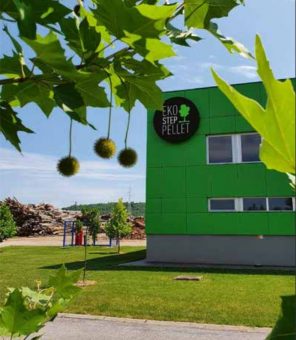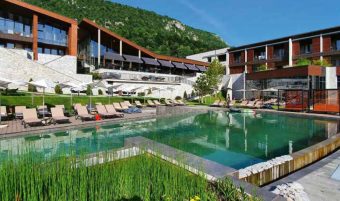
Pellets produced in the Eko Step Pellet factory have lower CO2 gas emissions, contain minimal moisture, and when burnt, the ash is below 1.2 percent, which is within the European A2 standards, with a tendency of reducing to A1. Besides that, pellet fuels are produced from raw materials that are of 100 percent domestic origin, namely from bogue trees coming from highly controlled sources. Due to high quality, they also bear the Serbian Čuvarkuća (Homekeeper) trademark, which is one of the bi recommendations for the buyers.
Nevertheless, considering the extent of the shadow economy and imports of uncertified pellets at lower prices, domestic pellets producers are facing a real problem. How can the authorities help solve this problem and how to encourage the citizens to switch from coal, oil, or wood to non-woody biomass boilers – we asked these and many other questions to Jadranka Stepanović, the owner of Eko Step Pellet, a company that abides by business eco-standards even in her Ramonda Hotel on the Rtanj mountain in East Serbia.
EP: How important are pellet fuels for environmental protection and energy efficiency?
Jadranka Stepanović: Our orientation towards environmental protection is unquestionable. Eko Step Pellet is a superb example of biomass use as an energy product and the production of pellets by applying the highest environmental standards. We produce pellets from bogue trees cut down for heating purposes, without mixing other kinds of trees and extraneous matters, which makes them high-calorie energy products and of high quality in terms of ecology. Pellets produced in this factory have low CO2 gas emissions, contain minimal moisture, and when burnt, the ash ratio is below 1.2 percent. Pellets are produced from 100 percent domestic raw materials. What is important for environmental protection, and above all forest capacities, is the fact that Eko Step Pellet company has signed a 10-year long contract with “Srbijašume”, a public company from Serbia, therefore allowing the procurement of bogue for the production of our pellets from highly controlled sources. Bogue coming to our factories is a tree meant to be cut down, in order to restore the forests in Serbia through afforestation, i. e. through constantly planting new trees.
In focus:
EP: What is the capacity of your Petrovac on the Mlava river factory? How many employees do you have?
Jadranka Stepanović: The installed capacity of our production line is 5 tones of pellets per hour, and factory potential can reach up to 35,000 tones per year. There are 43 hardworking and highly motivated employees in our factory, that are the heart and soul of the Eko Step Pellet company. We are especially proud of our five female colleagues who would, along with other colleagues, do anything to challenge gender equality stereotypes. We are all but a humble team ready to meet new challenges and succeed.
EP: What challenges and problems have the producers of pellets been facing this year?

Jadranka Stepanović: The biggest problem in pellets production is the gigantic disturbance in the electricity market in Serbia, but also in Europe. Namely, the price of electricity per kilowatt-hour increased rapidly in the past couple of months, therefore causing the rise of production prices of raw materials we use in the production of pellet fuels. The increase in prices also includes the price of wood assortments (in our case, of bogue), bag foils, and stretch wrap film. I would like to also add that we support the suggestion of Mr. Marko Čadež, the president of the Chamber of Commerce and Industry of Serbia, that the contracts we have with the Electric Power Industry of Serbia (EPS) continue to be valid under the prices previously set for another 120 days until we see what the European and global market situation will be! That would save the industry, as well as the end-consumers of pellet fuels! Another problem we have is the fact that, even though the construction of solar power plants and wind farms is expanding, their electricity production still cannot respond to high market demands. In the long term, the strengthening of EU capacities of renewable energy is probably going to help the sector to satiate the demand for clean and inexpensive energy sources. However, due to the marginal market system, and until big batteries for renewable energy storage in cases of bad weather are developed, the EU member states will keep facing similar situations. Another problem for pellets manufacturers is the black market as well as the import of non-certified pellets. Low prices of unverified manufacturers cause distrust in the domestic pellets manufacturers. Low prices of pellets guarantee neither quality nor their fuel power. Moreover, buying uncertified pellets causes problems for consumers’ pellets boilers. Eko Step Pellet, as a laureate of the Best of Serbia 2019 award and holder of the Čuvarkuća trademark, guarantees the quality of pellets it manufactures, so consumers can fully trust its price and quality ratio.
Interviewed by: Danijela Isailović
Read the story in the new issue of the Energy portal Magazine RECYCLING.
Translator Vesna Savić



